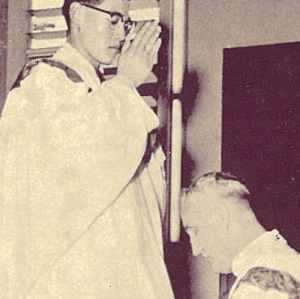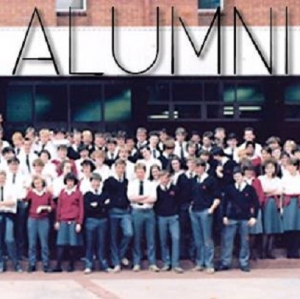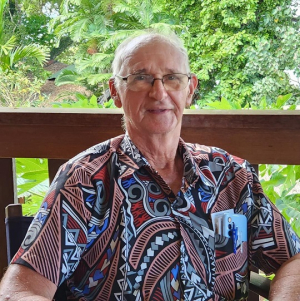Peter MALONE
Acknowledging Albert Chan MSC
Acknowledging Albert Chan MSC
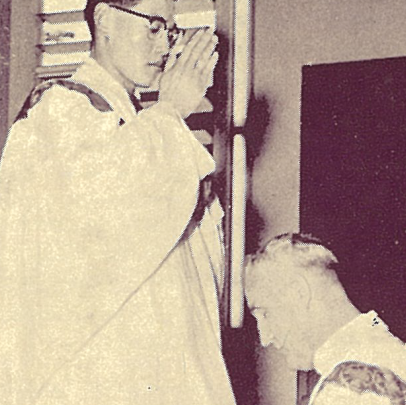
Vince Carroll MSC writes:
It may be of interest to know that Albert Chan MSC (Downlands 1948-53) from Rabaul, is having his 60th Jubilee next Tuesday 18th Oct, in St Stephens Cathedral along with some other notables - + Brian Heenan (of Rockhampton) and Fr Maurice Keating OP. I intend to attend. Albert of course was ordained in Rabaul in 1962 by then Bishop Copas (Downlands 1933) on 28th July.
Albert then worked at Downlands from 10 years from 1964 to 1973. John Ryan MSC (Downlands 1950-53) from Mundubbera, was also ordained that year in Brisbane but sadly died within a short time in 1964, while working at Daramalan. Fr Ray O’Leary (1954-55) from Warwick was yet another student from that year who became a diocesan priest in 1962: RIP 2021.
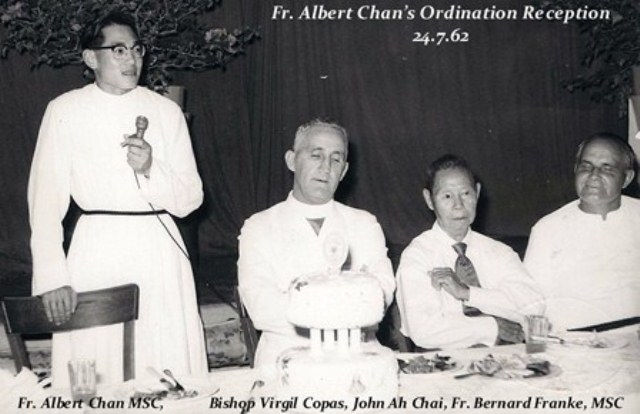
In 1962 three MSC Bishops from Australia and with Downlands connections were in Rome attending the Second Ecumenical council, and Bishop O’Loughlin had just completed and blessed St Marys Star of the Sea Cathedral in Darwin. They recently celebrated the Cathedral’s 60th Jubilee in Darwin. The Three Bishops in Rome were Bishop Doyle (Downlands Third Rector ’38-45 – the source of the phrase “the Downlands Difference”), Bishop Copas and Bishop O’Loughlin (Downlands 1936-45- Studies Master).

Acknowledging Albert's many years of ministry to the Chinese community in Brisbane.
Some stories of Daramalan College education and success tales.
Some stories of Daramalan College education and success tales.
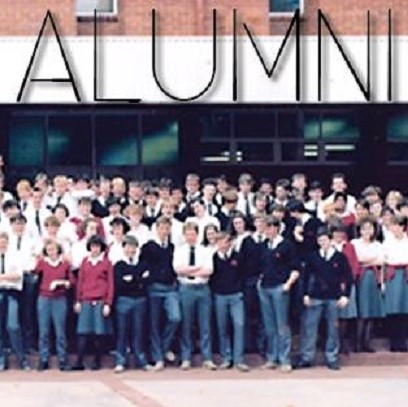
For MSC who have worked in the education ministry, there is a great deal of satisfaction in hearing stories of alumni making good. You will notice that the editor of the Alumni Facebook page is an inveterate lover of puns in some of the headings!
WE SHOULD HAVE BEEN A ‘BOARDING’ SCHOOL
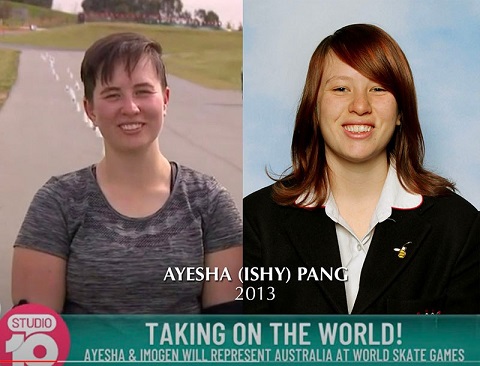
Ever heard of Slalom Skateboarding? No, me neither, but apparently it’s sorta like ‘normal’ skateboarding after you’ve knocked back a dozen or so beers. You’re all over the road, but in control, and travelling fast.
It’s most impressive; just ask ex-Dara girl Ishy Pang from 2013, who is now an Australian champion.
Ishy, known in the ‘real’ world as Ayesha, along with another Canberra mate, have both been selected to represent Australia at the World Skate Games in Argentine this month. Which is a huge feat as they are also the first women to represent Australia in Slalom Skateboarding, with Ishy only taking up the sport six months ago. It also featured at the Tokyo Olympics for the first time last year.
The girls train at the Mt Stromlo facility where many recent students would remember as the venue for the Dara annual cross-country day.
FANCY BECOMING A HOLLYWOOD PRODUCER?
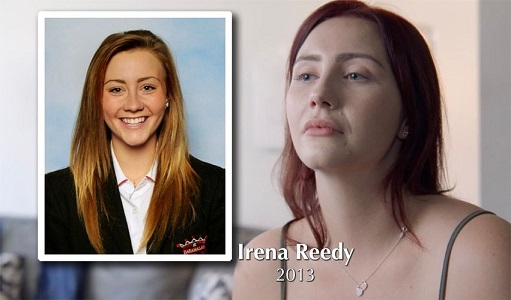
Well, now you can. Read on…
After leaving Dara in 2013, Irena Reedy moved to America to further her acting career. Initially trying her hand in Washington and Chicago for a couple of years, she decided to ‘bite the bullet’ and undertook an acting course at the prestigious Lee Strasburg Institute in New York, which boasts alumni such as Marilyn Monroe, Alec Baldwin, Uma Thurman and Sienna Miller to name just a few.
On completion, she moved to Los Angeles in 2017 to focus on a Hollywood career.
She is now in the final stretch of finishing her latest film called “Another Story”, which touches on how mental health affects relationships and what that can look like in an everyday situation. She said, “This is so close to my heart, as I wrote it from my own experiences and fears, which I have faced in my past relationships”.
Which brings me to how you can become a silver screen bigwig. To finish this current project, Irena is seeking some financial support, and in return, you can be credited as an Executive Producer. All the details are here including a five-minute preview of the production. http://www.indiegogo.com/.../another-story.../x/29311709...
JUDGEMENT DAY IS COMING
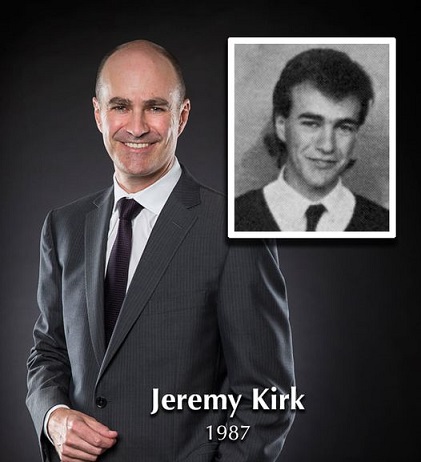
On Thursday 21 April to be precise. In the morning.
After 20 years practising as a barrister in Sydney, ex-Dara lad Jeremy Kirk from 1987, (brother of Tim “Clonakilla” fame) has been sworn in as a judge to serve in the NSW Supreme Court, the highest Court in the state. He will sit in the Court of Appeal, described by the Attorney General Mark Speakman as, “the strongest state or territory appellate court in Australia”. Well, what more can you say, except huge congratulations Justice Kirk. Your Honour.
WHEN TWO DARA BOYS PUT THEIR HEADS TOGETHER…
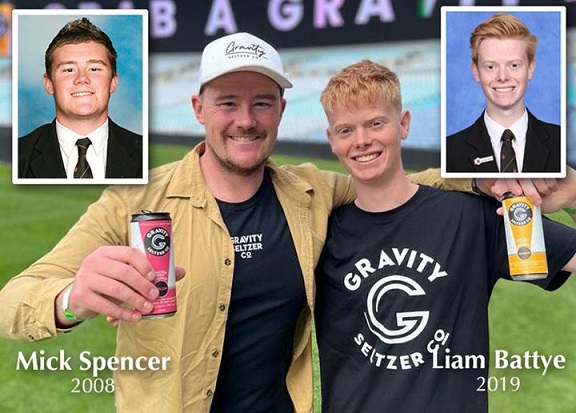
…it’s usually in a rugby scrum, but in this case, the union has resulted in a great idea. Mick Spencer (2008) and 2019 School Captain Liam Battye have joined forces and signed a multi-million-dollar deal to supply vegan seltzers (no, I don’t know what that is either) to major entertainment and sporting stadiums across NSW, including at the up-coming NRL Grand Final.
Their new product, called Gravity Seltzer, is already on sale in BWS stores, but with over 2.5 million people expected at various venues over the rest of the year, featuring everything from the sporting Finals, to concerts like Red Hot Chilli Peppers, Ed Sheeran, Harry Styles, Red Hot Chili Peppers and Guns 'N' Roses, stadium sales are going to be huge.
After leaving Dara, Liam went on to Uni and, looking for a business mentor, approached Mick who already was running the successful ONTHEGO sports clothing company. They decided they could do something different together and consequently came up with the seltzers. With the success they are currently enjoying Liam mentioned that “Although I'm still enrolled at Uni until 2023, I don't think I'll be going back".
Good choice Liam and congratulations to the both of you. Now, I’m off now to BWS to see what a ‘vegan seltzer’ tastes like.
QUEENIE IS ABOUT TO MAKE A SCENE…
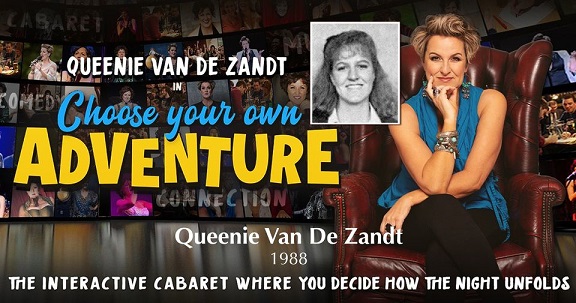
Even though Queenie van de Zandt (1988) has been described as a ‘vocal powerhouse’ by the Herald Sun, and filled with ‘awe-inspiring soul and emotion’ by the Sydney Morning Herald, you know they are missing something. Both of those esteemed publications failed to mention that her stellar career started in the Drama Department at Daramalan College. A major oversight!
Queenie is now back in town for one night only appearing at the Tuggeranong Arts Centre this Saturday with her new show called Choose Your Own Adventure. So Comedy? Tick. Cabaret? Tick. Trivia? Tick. Bowl of chicken soup? Ti…Wait, what?
Let’s just say that whatever your tastes, you’ll get to choose the night’s entertainment menu
This week’s photos MSC Eastern Papua
This week’s photos MSC Eastern Papua
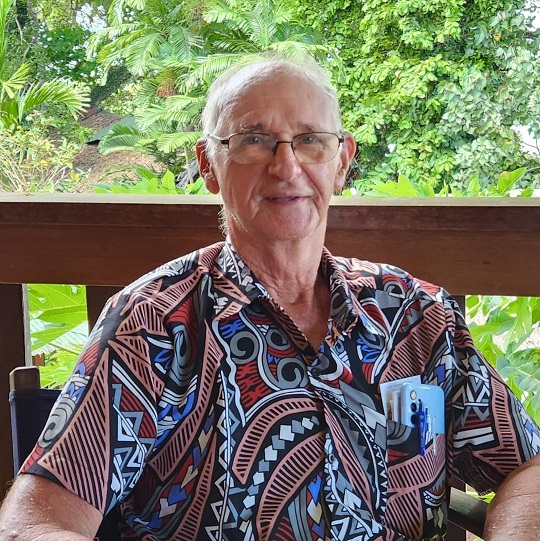
Joe Ensing
There are five Australian MSC in PNG today. They have all been there for many decades.
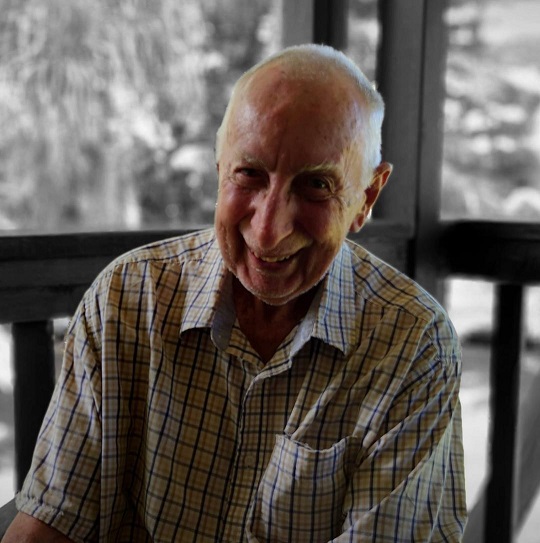
Tony Young
In Papua, Brian Cahill and Paul Guy. In Eastern Papua, Joe Ensing, Tony Young and Russ Andersen.
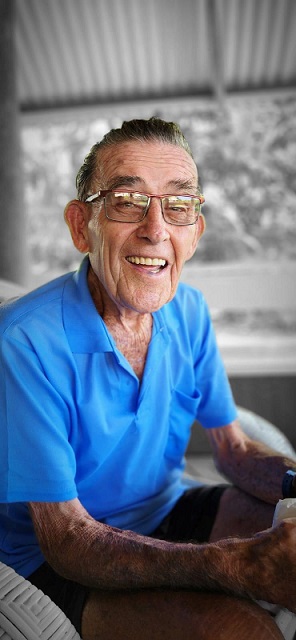
Russ Andersen
(Tony is 87 and Russ is 86.)

And Chris McPhee visiting Tapini and Brian Cahill last week.
Our appreciation and thanks and best wishes.
Everything in Between
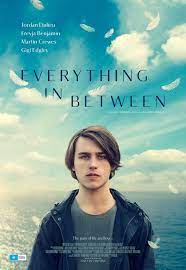
EVERYTHING IN BETWEEN
Australia, 2022, 90 minutes, Colour.
Jordan Dulieu, Freyja Benjamin, Gigi Edgley, Martin Crewes, Siham Yahya, Benjamin Matthews.
Directed by Nadi Sha.
About 20 minutes into this drama, a young hippie character from the US, wandering in Australia, Liz (Freyja Benjamin) explains the title. The parameters are birth and death and everything in between is life, to be lived. And this is a very important for the other central character, Jason (Jordan Dulieu) whom she has encountered at the hospital.
This is an Australian film with universal themes. As the title indicates, it is a film about life, the meaning of life, those disillusioned with life and wanting to end it as well as those whose physical condition and deterioration are leading to the end of life. The setting is Sydney – the southern and eastern beachside suburbs, the interiors of a fashionable home, many visits to the Royal Sydney Hospital.
The film is introduced by a hippie-like beach party, drugs and alcohol, music and dance, on the beach. And that is where we find Liz, with the drugs, but having some kind of physical as well as mental turn, wandering, at the high cliffs edge. At which stage we are introduced to Jason, aged around 20, immediately seen as morose if not depressed, riding in a taxi, monosyllabic replies, wandering a cliff path and standing on the edge, wanting to jump, or fall.
So, both meet at the hospital, Jason fussed over by his would-be glamorous mother, his father glimpsed having an affair with his secretary, but coming to take Jason home. It would seem that Jason has had a loner history, no friends, reading science books in his room, but no real life (and no flashbacks to explain or illustrate this).
Of course, we can see that the problem can be related to his relationship with his parents. As the film emerges, they are a mixture of love, good sense, bewilderment, self-preoccupation, worry about what they should do. In fact, his father (Martin Crewes) is better at being positive with his son than the often flighty but loving mother.
The important part of the film is the meeting between Liz and Jason, accidental, incidental, but a reminder that sometimes one small gesture, one small invitation can lead to changes in benefits never anticipated.
The film shows the friendship between Liz and Jason, Jason and his therapy, and interviews with doctors, the possibility of going into an institution, but his concern about Liz and her interviews with the doctors, diagnosis of a rare physical condition that requires surgery.
Liz is a strong character though at times overwhelmed by her prospects, especially on the eve of serious surgery. Jason, on the other hand, responds to another person in a way that he never has before, a concern, doing the right thing, a response to an outreach of friendship, responding to a need for support, leading to quite an emotional depthing.
A small film, themes which have been treated both in film and in documentary, but 90 minutes with characters who are worth the attention (even to the parents despite their limitations and irritations), and, as we look finally at the photo of Liz and Jason, we read her note about life, everything in between.
- A film about mental health, suicide, physical health, death – and everything in between?
- The Sydney settings, the suburbs and streets, homes, the beaches, cliff paths, hospitals? The musical score?
- The title, as explained by Liz? On the back of the photo?
- The introduction to Liz, the beach party, drugs, drink, singing and dancing, her drugs, not feeling well?
- The introduction to Jason, age, taciturn, in the taxi, along the path, the cliff, suicidal, the taxi driver and his bag, saving him?
- Both at the hospital, sitting adjacent, the casual talk? Jason, his mother arriving, her giddy style, the touch possessive, loving, clothes and make up? Phoning his father, his father having the affair with secretary? Jason going home? Liz remaining in the hospital?
- Liz, personality, moods, physical health, the diagnosis, her particular illness, the need for surgery? The terminal illness? And knowing that it was terminal?
- Jason, only verbal background to his loneliness, no friends, his room, the science books? Relationship with each parent? His mother fussing? His father, talking, practical, commonsense, encouraging?
- Jason going back to the hospital, wanting to be with Liz? Their talking, sharing, her moods, going out walking?
- Jason, the struggle, being taken to hospital, confined, therapist, the previous talks, analyses, the possibility of institution? Wanting to get out, to go to Liz? The past, escaping?
- With Liz, the talk, her moods, their being together, his falling in love, the sexual encounter, the effect on each?
- Liz, the surgery, her dying? The effect on Jason, his future?
Don't Worry Darling
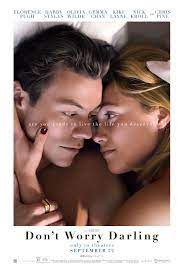
DON'T WORRY DARLING
US, 2022, 123 minutes, Colour.
Florence Pugh, Harry Styles, Chris Pine, Olivia Wilde, KiKi Lane, Gemma Chan, Nick Kroll, Sydney Chandler, Kate Berlant, Asif Ali, Douglas Smith, Timothy Simons.
Directed by Olivia Wilde.
For the first 20 minutes and more, audiences might be mistaken into thinking that they were watching a variation on a Desperate Housewives show, set somewhere or other, out in the desert beyond Palm Springs. Or, perhaps, there were memories of The Stepford Wives. We see the pampered husbands, suits and ties, getting into their cars, all in unison as they drive off in procession, the faithful housewives waving them goodbye before returning into their loving performance of household chores.
Where can this be going?
Quite a number of commentators have likened Don’t Worry Darling to The Truman Show. Actually, this did not occur to this reviewer all during the film but, in retrospect, it is probably a helpful point of reference. We know that this glamorous lifestyle, hedonistic, male-dominated, cannot be a real world.
And our point of reference is a devoted wife, Alice, played by the versatile Florence Pugh, slightly unsettling because she looks far too intelligent to be this kind of subservient bath-cleaner and cook. Her husband, Jack, is singer Harry Styles, looked like something out of a magazine. They seem to have the perfect life. And they are very libidinously active, but not wanting any children to spoil the pampered lifestyle, the luxury home, the swimming pool, the parties.
And the veneration for the founder of the community, Frank, played by an ultra-suave Chris Pine, giving earnest speeches in the style of an ambitious CEO and a cult leader. He pampers the egos of the community. But, we wonder what his enterprise is in this town of Victory which he has created.
Alice and Jack get on well with their neighbours, especially Bunny and Dean (Olivia Wilde who directs this film and Nick Kroll). They have two perfect children. So, the men off to work each day on the special project, the wives lounging around the pools while not doing the housework, and excitement when they are invited to a function where Frank and his wife are present or, even, visit their home.
While we’re waiting for something more desperate to happen, Alice is in a transit bus and sees a plane, which then crashes, and she ventures out into the desert to try to find it. The beginning of the end for her!
The drama becomes more tense, Alice’s suspicions heightened, clashes with Jack, confrontations with Frank, advice from Bunny who wants to help, and red overalled guards ready to grab hold of Alice and remove her. Fortunately, for some comprehension, there are some flashbacks to her real past, career and life with Jack, while Alice is subjected to all kinds of medical/physical procedures. And the point will be, will Alice be “cured” and become, once more, a Stepford wife, or will there be some disasters – and can she possibly escape?
So, contrary to the title, there is quite a lot to worry about!
- The title, the tone, relationships? Ironies?
- The atmosphere of Desperate Housewives, Real Housewives…? Stepford Wives? Luxury resort? Lifestyle? Yet the revelation of the science-fiction, science fantasy background?
- Victory, the town, luxury, the homes, interiors, appointments, swimming pools? Husbands and wives? Children? The husbands, in suits, the cars, the symphony of them moving out to work, the long line? And the return home? And the revelation as to what their work really was? Engineering and importance? The wives at home, their clothes, the joy in doing the housework, cooking? The libidinous husbands, wives, sexual encounters?
- The focus on Alice and Jack, no background, the relationship, his being the typical husband, going to work? Her staying at home, cleaning the bath, friendship with Bunny and the other women, that the pool? Jack returning, sexual encounters, the meals? Alice accepting this?
- The other couples, the man and the parties, drinking, fellowship? Personalities? The other women? Bunny and Dean, her children response? The pregnant wife? But Margaret taken from her husband, kept in confinement, mental health, his being demoted?
- Alice, in the trolley, seeing the plane, its crash, the driver refusing to go, her venturing out, against the rules, the desert, the installation of the top of the mountain, its effect on her, the return? Keeping his secret? Yet her suspicions?
- Frank, the mixture of cult leader, CEO and guru? His speeches, the founding of Victory, the work project, the hold on the husbands, promotions, highlighting Jack, the dancing performance, the jacket, his new status? Frank and the intensity, the interactions with Alice? Frank and his wife, her strong personality, always present? At the socials, the speeches, the dancing? And the possibility of Frank visiting a house, coming to visit Alice and Jack?
- Alice, her reaction, critique, the tension at the dinner table, the visitors, Frank and his wife? Alice and the challenge, Frank, the accusations, Jack and his bewilderment?
- Alice, the guards taking her away, the treatment, the flashbacks and her role as a doctor, relationship with Jack, the transformation to living in Victory? Electric shock and treatment?
- Her return, Bunny and her warnings and knowing the truth? The other women? Margaret, on the top of the building, her fall, then taken away, the lies that she survived, her treatment?
- Alice and Jack, the confrontation with Jack, his death?
- Frank, the stances of his wife, her killing Frank and taking over?
- Alice, the car, the pursuit, the mountain, the guards, her climbing, going to the facility, against the wall, the portal, her escape, the final breath?
- The combination of wealthy lifestyle with male patriarchy, science-fiction?
Wog Boys Forever
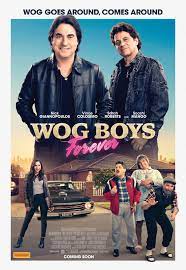
WOG BOYS FOREVER
Australia, 2022, 109 minutes, Colour.
Nick Giannopoulis, Vince Colosimo, Sarah Roberts, Annabel Marshall-Roth, Anthony J.Sharpe, Costa D'Angelo, Carlo Salantini, Liam Seymour, Havana Brown, Newnest Addakula.
Directed by Frank Lotito.
While Nick Giannopoulis and his stage presentations were popular in the 1990s, the first Wog Boys film was released in 1999. Then came The Kings of Mykonos in 2012. And now the third instalment – decades between gigs! Fans (and non-fans), of the first two films will know what to expect.
This is a film of broad (sometimes very broad) comedy, quite a lot of basic jokes, right from the start. But as it goes on, it is like its predecessors, an acknowledgement that, apart from First Nations people, everybody in Australia is a migrant or descendant of migrants, whether they want to acknowledge this or not. And, the point is made, that every migrant generation tends to be wary of, critical of the next.
It is probably better to be a reviewer than a critic of the Wog Boys films, critics tending to take a dim view of this kind of comedy. The role of the reviewer, on the other hand, is to note what works and what doesn’t work, what is amusing and what might not amuse so much. Delving into files, this reviewer wrote about The Kings of Mykonos, ‘This is not highbrow artistic comedy and those who look at it as if it were highbrow make the equivalent mistake of reading a newspaper’s comic strip as if it were the editorial.’ Still true of this film.
There is a lot of laying the basic ground work in the early part of the film, re--introducing Steve Karamitsis, comedian and writer Nick Giannopoulis.long-standing character. But now, he has been alienated for years from his friend Frank (Vince Colosimo doing his usual), driving a cab, part of the team of cabbies most of whom seem to come from the subcontinent, establishing just how many migrants there are in Australia, where they live, their jobs, and issues of visas and the government. And Steve has some bizarre neighbours who provide some of the basic jokes.
Then, the film becomes a bit more interesting when there are some indications of plot. In fact, there are two plot streams which come together. The first is romantic, Steve suddenly finding his passenger is Cleo (and engaging Sarah Roberts) whom he dated or week eighteen and a half years before. Steve has become rather reclusive, a touch remote, morose, let alone older, not the Steve that we knew before. This line of plot leads to him following Cleo, her date with a young man, her being a DJ at a big Melbourne nightclub, and some touches of raucous comedy as Steve is forbidden into the club, takes the role of the bus driver for a load of rowdy tourists, and traps the house manager being bigoted on video. And Steve discovers that Cleo’s date is her son, Michael (Costa D’ Angelo). Could it be his, he thinks it is – with some woebegone consequences for him.
But the main part of the plot, perhaps the interesting part, is political. We may or may not remember that Steve and Frank fell foul of an ambitious politician way back in 1999. And now we have her two children, as ruthless as she, one a minister in government responsible for migration. The younger brother does her beck and call. They want revenge on Steve because of their mother and are into all kinds of entrapment. And she has a link with the rather narcissistic and sleazy owner of the nightclub who has been Cleo’s partner for some years.
The plot definitely thickens with all kinds of shenanigans.
But, it looks as though Nick Giannopoulis Pauline Hanson Lee in front of in mind while writing the character of the racist, Australia first, campaigning-for-Senate politician. She has some diehard supporters – but they are not the kinds of people who will be lining up to see Wog Boys Forever.
Of course, it does work out, Steve and Frank united, some pathos with Frank’s father dying, Steve bonding with Michael over cars, both happy and cheerful ending. (And for movie buffs, there is Saturday Night Fever disco, allusions to the monolith in 2001: A Space Odyssey, and a parallel to the baptism sequence in The Godfather.)
So, once again, a reminder that this is very broad comedy with migrant and ethnic issues.
Muru
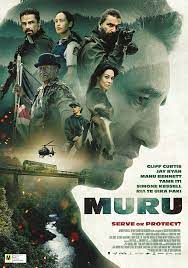
MURU
New Zealand, 2022, 104 minutes, Colour.
Cliff Curtis, Jay Ryan, Manu Bennett, Simon Kssell, Tame Iti, Roimata Fox, Ria Paki, Poroaki Merrit-McDonald, Xavier Horan.
Directed by Tearepa Kahi.
This is a striking New Zealand drama, raising pressing issues of traditional Maori culture, colonial backgrounds, some paranoia, the role of political authorities and special police units.
At the beginning, there is a statement that the police do not support the activities portrayed in the film. And we wonder what this could mean. In fact, the screenplay is fictitious but is grounded in three episodes, one in 1916, a shooting in 2000, a siege and pursuit in 2007, all victimising Maori people, and heavy-handed and violent intervention by the authorities.
It is something of a surprise when we see a local group climbing a mountain, holding a meeting, telling stories, local language, a boot camp for identity and survival skills, and a brash young man causing problems, Rusty. And then we see that this meeting, seemingly remote, is actually under surveillance from several hidden heat cameras. The leader, played by Tame Iti as himself, is suspected of subverting a group with the aim of killing the Prime Minister.
But, down the mountain, in the quiet village of Ruatoki, things seem calmer. We see Tash (played by internationally successful actor, Cliff Curtis) driving the local school bus as well as carefully attending to his ageing father who is on dialysis. And we learn that he is a member of a local police unit. In the meantime, Rusty has shown himself a rebel, smashing the glass windows of the bakery, but under the care of his parents – but the authorities taking this as further evidence of rebellious action. And, when he is seen on horseback with a broom, going to clean up the mess at Tash’s request, the surveillance team interpret that he has a weapon and pursue him.
There are complications, misunderstandings, continuous police surveillance, phone calls to Wellington to the Minister (who is aggressive and face-saving at the same time), and the introduction of the STG, the New Zealand police Special Tactics Group, led by the earnest Gallagher (Jay Ryan), who has struggles with his strict sense of duty and some human compassion, unlike his aggressive, trigger-happy associate, Kimiora (Manu Bennett). Also involved is Tash’s police associate, Blake (Ria Paki), Maria who is on the surveillance squad, Rusty’s parents who are driving him after he is shot for treatment by the local travelling doctor.
Most audiences will easily identify with Tash, his sense of duty, his pleasing care of the children on the bus who are left stranded, his upset when his father is taken by the police, his concern for Rusty, his finally being arrested, put on a pursuit helicopter with Gallagher and Kimiora as they chase Rusty. And some unexpected drama ensues.
While there is some underlying anger in the treatment of these unjust memories about the people, the police, government authorities, the film just develops its characters, their interactions, voicing the concerns, and presents the action crises so that the audience becomes involved and has sufficient grounds for making their judgements about what happened – and the ever-present tragedies in racial prejudice and aggression.
- The title? Maori languages? The meaning of forgiveness?
- The bases of the plot, the episode in 1916, the shooting in 2000, the attack on the village in 2007, alleged protest, plots to kill the Prime Minister? A fictional incorporation of each of these elements?
- The police statement at the beginning, not endorsing this kind of police activity?
- The location photography, North Island, the village and lifestyle, homes, school, the countryside, mountains, rivers? The musical score?
- The introduction to the characters, climbing the mountain, the gathering, survival, morale boosting, the leader (played by the actual leader), his facial figurations? The language, the enthusiasm, men and women, the boot camp, Rusty and his reactions, the shot?
- The revelation that this was all being covered by official surveillance, the police, hidden cameras?
- The introduction to Taff, at home, driving the bus, with the kids, one of the local police? His visits to his father and his care for him? The father, illness and need for dialysis? Blake, the other member of the local police team?
- The Special Tactics Group, the surveillance, the information, the interpretation, protest and uprising, the phone calls to the Minister, his attitudes, interpretation, decisions, hostile?
- The personalities of the leaders, Gallagher and Kimiora, the female surveillance member? The team? Orders, tactics, harsh and hard?
- Rusty’s story, drinking, wandering, breaking the windows of the bakery, returning to his parents, Taff and the reprimands, getting him to repair the windows, Rusty on his horse, the broom and the photos, interpreted as a weapon? The pursuit? Accosting him, confrontations, his being shot, getting away? His parents and the truck? Taff and Blake helping? Maria, her intervention, her being taken, held in the vehicle?
- The news that the leader was taken, his work with the bees? The news that Taff’s father was taken, held, bag over the head? The camera communication? Taff and his reaction?
- Rusty, in the vehicle, the contact with the local doctor, her caravan, the driving to meeting, the helicopter and pursuit?
- Taff taken, the headquarters, his father? The different attitudes of Gallagher and Kimiora? Taff in the helicopter, trying to save Rusty? The struggle with Kimiora, falling from the helicopter? The gun? Taff and his injuries?
- The role of the police informer, Kimiora and his shooting? The rescue of Rusty, after their shooting the car and killing his father? Blake and Maria?
- Taff, the injuries, saving Rusty, his death?
- Reminders of the colonial past, the consequences, contemporary villages and communities, under suspicion? The authorities and harsh interpretations?
Mr Harrigan's Phone
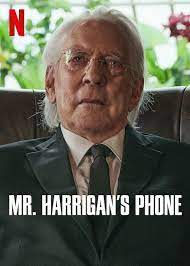
MR HARRIGAN'S PHONE
US, 2022, 104 minutes, Colour.
Donald Sutherland, Jaeden Martel, Kirby Howell-Baptiste, Joe Tippett, Cyrus Arnold, Daniel Reece.
Directed by John Lee Hancock.
Many audiences will be attracted to this film because it is based on a short story by Stephen King. On the other hand, any audiences who watch the film without knowing the author, will be surprised to learn that it is by Stephen King. It is not in his usual vein. It is not really a horror story. There are touches of the supernatural – but especially linked with cell phones and social media.
The first part of the film has Stephen King at his more gentle (reminding us of such stories as Stand By Me). Craig is an earnest young boy, his mother just dead, living with his concerned father. He reads at church.
In the congregation is Mr Harrigan, a daunting figure, elderly, recluse, played effectively by Donald Sutherland in his mid-80s. Mr Harrigan is keen to find someone to read novels to him and offers the job to Craig. Craig reads various novels, the titles coming up on screen, including Dombey and Son, Heart of Darkness, with Mr Harrigan repeating the famous utterance of Kurtz, the Horror. And this goes on for some years, Craig turning up several times a week, receiving payment, and, for his birthday, a scratch card (ultimately winning good sum of money).
Craig grows up, goes to school, has some friends, is attracted to one, goes to a dance with her. However, there are bullies at the school, especially Ken, who bashes Craig who does not turn Ken in.
Halfway through the film, and unhappily for older audiences who value seeing Donald Sutherland, Mr Harrigan dies, leaving money to Craig which will help him in his going to college. Donald Sutherland has given a strong performance as a recluse, a ruthless moneymaker, managing businesses, alienating people.
One of the key elements of the story, making it more contemporary, is the cell phone, Craig asking his father to get him one because all the other friends at school had one and his father obliging for his birthday. And Craig gives a phone to Mr Harrigan who does not believe in it, is shown how it gives so much immediate information, the various apps, that he becomes intrigued by it, getting a melody for tone, and a phone name. When he dies, that the viewing, Craig puts his phone in Mr Harrigan’s coat pocket and it is buried with him.
One of the characters who has helped Craig at school is a sympathetic teacher. She is killed in a road crash, the driver of the other car intoxicated, given a suspended sentence to go into rehab – but the audience seeing him smirking during the sentence. He goes to a very comfortable rehabilitation centre.
Craig bribes one of the officials to find out the details of what happened to the driver, especially his suicide in the shower. Craig is disturbed because he has tried to communicate with Mr Harrigan by the cell phone and believes that Mr Harrigan has been influential in the driver’s killing himself. Which provides a moral dilemma – whether there is supernatural contact via such a means as a cell phone, whether Craig should follow this or toss away the phones.
Stephen King horror fans were not impressed by this particular Stephen King story.
- The title, the emphasis on phones, in the past, cell phones, information, access – and the possibility of communication from the afterlife?
- From a story by Stephen King, a human, humane story, minimal emphasis on the supernatural, minimal horror?
- The town in Maine, the to thousands, Craig and his home, his father’s work, church, going to Mr Harrigan’s mansion, the use of reading, Mr Harrigan’s death? The years passing, high school, classes, teachers, bullying? Craig graduating, the course in Boston? The musical score?
- Craig’s story, the impact of the death of his mother, the final visit to her grave? The bond with his father, his father’s care? Church, reading? The invitation from Mr Harrigan, his going to the house, titles of the books read, their impact, on Craig, on Mr Harrigan? The bond over the years, Mr Harrigan asking why Craig came, his reasons, and because he wanted to? The payments, regular, and the red Devil cards? His winning a larger sum?
- Mr Harrigan, the newspaper articles, ruthless, business, companies, retiring, not wanting any attention? Reading the papers? Listening to the books?
- Craig, his friends at school, their company, the attractive girl, talking with her, the phones, at the dance? Kenny, bullying, brutality, the intervention of the teacher, Kenny bashing Craig at the dance, thinking he had betrayed him to the police? Can his accident and death? The impact on Craig? Wanting to understand him and his family?
- Mr Harrigan’s death, quiet, Craig’s disbelief, ringing his father? The funeral, the phone, putting it in his pocket? The importance of the gift of the phone from Mr Harrigan, initial resistance, discovering all the information available, the various apps, the Internet, all the information free of charge (which he did not approve of), is continually being on his phone? Loretta Lynn, the music, the call, his name?
- The effect of the death? Halfway through the film? Craig, the phone, sending messages to Mr Harrigan, going to the grave and hearing the ring tone? The lawyer, $800,000, payment for college?
- Time passing, the years of school, the graduation? Going to college, the writing course, his mentioning film writing in LA to Mr Harrigan, disapproval?
- Some communication with Mr Harrigan, with Kenny’s bullying? And the shock of his death?
- The role of the teacher, kind, intervening, encouraging, the story of the crash and her death? The audience seeing the driver, drinking, smoking in court when sentenced to rehabilitation?
- Craig, trying to communicate with Mr Harrigan, vengeance on the driver? The news of his death? Craig going, posing as a reporter, paying $200, getting the information, the film visualising the suicide of the driver? The effect on Craig, that revenge was not sweet?
- The death, jolting Craig, making him rethink his life, throwing the phone into the water?
- A very low-key Stephen King story, and the touch of the supernatural, and the cell phone as a means for communication by the dead?
Moving Finger, The
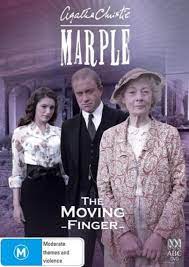
THE MOVING FINGER
UK, 2006, 93 minutes, Colour.
Geraldine McEwan, James D'Arcy, Harry Enfield, Keith Allen, Frances de la Tour, Ken Russell, Thelma Barlow, Jessica Stevenson, Sean Pertwee, Imogen Stubbs, Kelly Brook, John Sessions, Rosalind Knight, Emilia Fox, Ellen Capron, Tallulah Riley.
Directed by Tom Shankland.
Agatha Christie novels have been perennially popular as have the various film and television versions of her stories. There are several television series focusing on Miss Marple, with performances by Joan Hickson, Geraldine McEwan, Julia McKenzie.
As usual, this one is set in a small village, the focus on a British and man, played by James D’Arcy, who suffers from PTSD. He and his sister move into a house in the village – with the usual range of characters and suspects. However, the audience sees that a military man has received a poison pen letter and kills himself.
In fact, there are a poison pen letters circulating throughout the village, accusations, some true, some innuendo, some false. Which leads to quite a range of possible suspects, finally suspicions are leading to a young woman, Megan (Tallulah Riley) who grew up in the village, is disliked, but the airman becomes infatuated with her. There is also a very attractive governess to the children of the local solicitor, and the attraction of the airman to her. There is the solicitor, his moody second wife, her death, the local doctor, his sister, the local vicar and his wife, a neighbour. There is a special treat for movie buffs because the vicar is played and his eccentric way by film director, Ken Russell.
All kinds of suspicions, the murder of the maid who has been witness to what has happened – but, Miss Marple solving everything, with the help of the young woman, and, unlike all the other Agatha Christie stories, a very mundane solution, the plot irrelevance of the poison pen letters, only a cover, and that is where we find the twist.
- The popularity of Agatha Christie mysteries? Of Miss Marple? The three actresses? Two versions of the story?
- The post-war setting, Britain, the countryside, the village, mansions, vicarages, business offices? The musical score?
- The title, the poetic reference, Omar Khayam?
- The introduction to Jerry Barton, his voice-over, the war experience, what we recognise as PTSD? His life, women, on the bike, reckless, willing to die? Surviving? His being cared for by Joanna? The coming to the village? Miss Barton, her moving out, renting? Their settling in the village? Jerry restless?
- The poison pen letters, the range, seeing the author cutting out the letters, pasting them, the envelope, the postbox? The range of people receiving the letters? The variety of reactions? The opening, the Colonel’s desk, his letter, killing himself? Miss Marple, association with him, her coming for the funeral?
- The range of people in the town, the possible suspects?
- Ken Russell as the vicar, flamboyant as ever, his appearance, manner, love of Latin, reciting the classics, his performance of Cicero? And his conducting of the funerals? Maude, his patient wife, long-suffering, understanding him, friend of Miss Marple, encouraging her to investigate?
- Miss Barlow, age, place in the village, finding a companion, receiving a letter, her being upset? The irony that the book from which the letters were taken is found with her? Her speech to the performance about the letter?
- Symington, business, documents, his office? His relationship with Mona, her fragility, harsh comments? With her daughter, Megan, being her stepfather, not able to control her? His two boys, Elsie Holland as the governess? Comment that Ms Holland was the only one not to receive a letter?
- The meeting with Pye, his manner, criticisms of the vicar, eventual revelation of his relationship with the Colonel and the Colonel’s killing himself?
- Megan, schoolgirl, Jerry’s attraction, trying to help, the death of her mother, Jerry inviting her to stay with him and Joanna, her doing so? Wanting to go home? Her animosity towards everyone in the village? Her becoming the main suspect?
- Jerry, becoming more involved, the attraction to Elsie Holland, to Megan? His sister’s concern about him? Drinking? His dreams?
- The doctor, his place in the village, difficulties in the north earlier, the prescriptions, the presence of his sister, her severity of manner? And her attraction towards Symmington?
- The maids, the older maid upset with Agnes, the planned meeting, Agnes and the glimpses of her boyfriend, the market, the break, her day off, remaining in the house, wanting him to come, his not coming, the discovering of Mona’s body? And Symmington and his plan, killing her?
- Miss Marple, taking over, the plan with Megan, her stepfather wanting to get rid of her, the poison, carrying her downstairs, the oven, the police and Jerry rescuing her? Miss Marple’s plan?
- Inspector Graves, the investigations, interactions with Miss Marple, lower key investigating than in many of the other films?
- The irony of the Agatha Christie plot, the poison pen letters being a distraction, nothing to do with the ultimate murders, Symmington, Rose’s murder and motivations, his infatuation with Elsie, wanting to get rid of his wife, staying respectable, the attack on the maid because of what she had seen and not seen, the attack on Megan?
- The effect on Megan, saying she did not love Jerry, but the experience, changing her mind, Miss Marple as matchmaker?
Parfumeur, Der/ The Perfumier
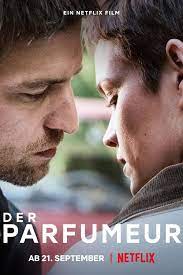
DER PARFUMEUR/ THE PERFUMIER
Germany, 2022, 96 minutes, Colour.
Emilia Schuler, Ludwig Simon, Robert Finster, August Diehl.
Directed by Nils Willbrandt.
Perfume was a celebrated 1985 novel by Patrick Susskind. It was filmed in 2006 by Tom Tykwer with Ben Whishaw and Dustin Hoffman, Perfume: The Story of a Murderer. In 2018 two has a six part German miniseries, Perfume.
This film is comparatively brief, has a contemporary setting, derives its plot from Patrick Susskind’s novel, and the theme of relating perfumes and scents to emotions.
The film is basically a police investigation story, the focus on policewoman, Sunny, who has lost her sense of smell. She is fascinated by her investigation of Dorian, an eccentric young man who has been experimenting with various scents, while having discovered one which is associated with sexuality and sensuality, is determined to find a scent associated with the emotion of love. In his experiments, he has abducted several women, aided by an eccentric friend from childhood, Rex, and disposed of their bodies.
There is a complication in Sunny’s life and her relationship with married fellow police officer, Juro.
Sunny pursues Dorian and allows herself to be abducted by him to participate in his experiments. This clashes with her police work, collaboration with the dual role, coming to the attention of her superior.
She wants Dorian to educate her so that she can recover her sense of smell – which, in his way, he does. However, she continues to pursue him.
- The title, the focus on the sense of smell, the creation of perfumes, ideal perfumes, unscrupulous means to an end?
- The relationship to the original novel, Tom Tykwer’s film version with Ben Whishaw and Dustin Hoffman? From the 19th century to the 21st-century?
- An imaginative riff on the original novel and film? The narrow focus, on Dorian, on Sunny?
- Contemporary German setting, police work, police precincts, homes and relationships, the focus on Rex and her strange world, on Dorian and his laboratory? The musical score?
- Sunny’s story, her age, experience, her police work, dedication, collaboration with Juro? The relationship with him, his wife and children, her compulsion towards him? Her loss of the sense of smell when she was young, the effect on her? The investigation of Dorian, Rex, their work, the perfumes? The raids, her taking the vial of perfume, the sexual attraction perfume, her using it, the effect on Juro, his behaviour, together, getting the house, setting it up?
- The film giving the background of Rex, her personality, her helping of Dorian in the past, their working together, her being captured, prison, using the perfume on the guard, her escape, reuniting with Dorian, their collaboration? The confrontation with Sunny?
- Dorian, his age, his experiments, his talent, the bizarre experiments, the women, the extraction of the scents, the women victims, Rex and her picking up the young woman, the disposal of her body? The police investigation? Rex and her skill with piercing skin?
- Dorian, personality, reclusive, the past, his father, his ideal of getting a scent for love rather than just sexuality?
- Dorian and Sunny pursuing him, together, his saying she was his pearl, inspiration? Her own hopes and desires? Her asking him to educate her in being able to smell again, his various means, memories of her childhood, resuscitating them, his growing desperation, getting rid of her?
- Sunny, the return of the sense of smell, the effect on her, with Juro? The visit of his wife and children, her decision to let him go?
- Dorian, wandering, the ambition, getting in touch with the expert, their meeting, discussions, the expert and his taunting? Leaving Dorian?
